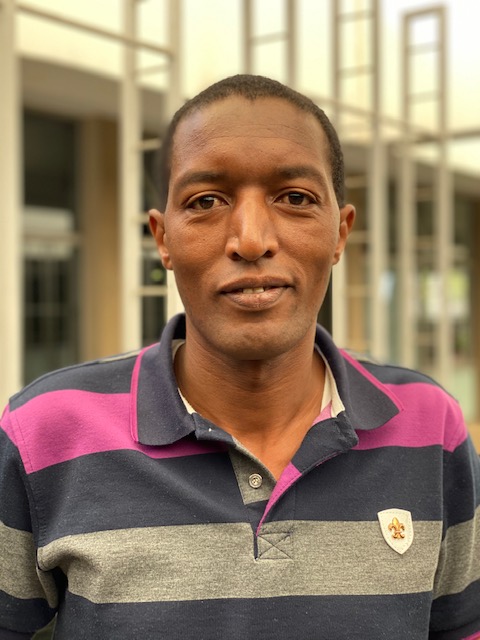Researchers

| Prof. Corné Van WalbeekDirector of REEP and Professor, School of Economics, University of Cape Town Corné's research interests are primarily in the economics of tobacco control, and in particular how changes in the excise tax on tobacco products can affect cigarette consumption. Within this field, his research has focused on the estimation of price elasticities of demand, how excise tax increases impact different socio-economic groups, how price and income changes affect the affordability of cigarettes, and the industry’s reaction to changes in the tobacco excise tax. In 2010 he developed the Tobacco Excise Tax Simulation Model (TETSiM). This model has been used in more than 20 countries to estimate the likely impact of a change in the excise tax structure and/or the excise rate on tobacco consumption and government revenue. Since 2011, when the Economics of Tobacco Control Project (the predecessor of REEP) was founded, Corné's research has focused more on low- and middle-income countries. Through the WHO FCTC Knowledge Hub on Tobacco Taxation, which is based within REEP, he and his team have supported many countries to think critically about their excise tax systems, and to improve them. In 2020 the REEP group was at the forefront of evaluating the 20-week ban on the sales of tobacco products in South Africa. Illicit trade is a significant concern in South Africa, and he and his team have conducted many studies to estimate the size of the illicit market. His PhD thesis, completed in 2005, was entitled “The Economics of Tobacco Control in South Africa”. |

| Dr Estelle DauchyPrincipal Research Officer (Professor) at REEP, University of Cape Town Estelle is the Principal Research Investigator (research equivalent of Professor) and Deputy Director. Prior to joining REEP in 2024, Estelle was the associate director of international research the Campaign for Tobacco Free Kids in Washington DC, where she led research and provided technical assistance to tobacco control advocates, research think tanks, and government officials to support effective tax reforms aimed to reduce the use of harmful products in several countries. Dr. Dauchy was previously an assistant professor at universities in China and Russia where she taught several courses and pursued research in public finance. After receiving her PhD from the University of Michigan, she also spent a few years at Ernst & Young’s Quantitative Economics and Statistics, Washington D.C. as senior economist in international corporate tax policy. Her research covers all aspects of tobacco economics. In recent years she has become specialized in the economics of new and emerging tobacco & nicotine products (e.g., ENDS, HTPs). |

| Dr Zunda ChishaResearch Officer and the Programme Director of the WHO FCTC Knowledge Hub on Tobacco Taxation Zunda's research focuses on the economics of health taxation, the illicit trade in excisable products, and the broader social and commercial determinants of health, particularly in low- and middle-income countries. He holds a PhD in Economics from the University of Cape Town, where his doctoral thesis, Economic and Health Implications of Tobacco and Alcohol Use in South Africa: A Household Expenditure Analysis, examined how tobacco and alcohol consumption affect household spending patterns and child health outcomes. Using nationally representative data and advanced econometric techniques, his work provided new insights into how fiscal policies on excisable goods shape welfare and development outcomes, particularly among low-income households. Zunda also holds a Master’s in Public Health (Health Economics) with distinction from UCT and a Bachelor’s degree in Economics from the University of Zambia. His professional experience spans research, policy advisory, and programme implementation across health and fiscal policy sectors. He has served as a consultant for the World Bank, UNICEF, and the South African National Department of Health, contributing to analyses on health taxes, illicit trade, and domestic resource mobilization for health. Through his leadership at the WHO FCTC Knowledge Hub on Tobacco Taxation, Zunda supports governments and civil society organizations globally in developing and implementing evidence-based tax policies that promote public health, reduce inequities, and strengthen domestic financing for sustainable development. |

| Vanessa DarsamoResearch Officer Vanessa is a Research Officer at REEP, working on research on taxation and consumer behavior for cigarettes, waterpipe tobacco, and sugar-sweetened beverages. She is currently registered for a PhD in Economics. Vanessa holds two Master’s degrees: one in Applied Economics and another in Development Economics from the University of Cape Town. One of her Master’s theses focused on sugar-sweetened beverage (SSB) affordability and the SSB demand elasticities in Nigeria. |

| Sam FilbyResearch Officer at REEP and the Tobacco Taxation Manager of the WHO FCTC Knowledge Hub on Tobacco Taxation Sam is a Research Officer at REEP and the Tobacco Taxation Manager of the WHO FCTC Knowledge Hub on Tobacco Taxation. She is also a PhD candidate (Economics), and contract lecturer and course convenor in the School of Economics at UCT. Sam has been affiliated with REEP since 2016 and joined the Unit as a permanent staff member in 2019. Her research interests include the economics of tobacco, alcohol and e-cigarette control in low-and-middle income countries. |

| Kirsten van der ZeeResearch Officer Kirsten is a Research Officer at REEP. She has a Master’s degree in applied economics, from UCT, and joined REEP in 2017. Kirsten has conducted tobacco tax simulation modelling for numerus country contexts, and engaged with policymakers to advocate for tax reform. She has been involved in data collection, including tobacco price surveys and smoker surveys. She has published research in the areas of illicit trade in tobacco, tobacco taxation, and others. The majority of her work has been focused on the African continent but has also extended beyond. |

| Dr Nicole VelliosSenior Research Officer Nicole is a Senior Research Officer at REEP. She graduated with a PhD in economics from UCT in 2022. Nicole’s PhD thesis focused on the economics of quitting cigarette smoking in South Africa. Using survival analysis techniques applied to data from the National Income Dynamics Study and price data from government documents, she found that an increase in the price of cigarettes is significantly associated with quitting behaviour. By surveying UCT students, and showing them various cigarette packs with different attributes, she found that plain packaging (where all branding is removed and graphic health warnings are printed on cigarette packs) would reduce the demand for cigarettes. Since access to cheap, illicit cigarettes could reduce the effectiveness of excise tax increases and plain packaging in reducing smoking prevalence, she measured the size of the illicit market. She found that, since 2010, illicit trade increased sharply, and accounted for about a third of the total market in 2017. Updated estimates show that illicit trade in 2022 accounted for around 60% of the total market. Nicole has published papers on tobacco, alcohol, cannabis, and student tuition fees at UCT. |

| Dr Leoné WaltersSenior Research Officer Leoné joined REEP in January of 2024 as a Senior Research Officer. She is an applied economist that combines insights from economics, political economy and history. Her research aims to better understand the political economy and economic history of the tobacco and alcohol landscapes. She is interested in the dynamics between economic and political actors, and institutions within the tobacco and alcohol sectors, exploring their socio-economic consequences and how policy can address this. Leoné holds a PhD in Economics from the University of Pretoria. Prior to joining REEP, she was a postdoctoral research fellow at the Laboratory for the Economics of Africa’s Past (LEAP) in the Department of Economics at Stellenbosch University. |

| Mxolisi ZondiJunior Research Officer Mxolisi works as a Junior Research Officer at REEP. He studied Economics and Statistics for his Bachelor’s degree and completed a Masters degree in Econometrics at the University of Pretoria in 2021. He has worked with tax and survey data before and is passionate about data quality. At REEP, he focuses on enhancing the unit's research capacities using new and innovative datasets and also work with tax simulation models. |

| Gameli AdikaPostdoctoral Research Fellow Gameli holds a BA in Economics from the University of Ghana and an MA in Economics from the University of Botswana. His PhD in Economics at UCT (submitted for examination in December 2025) focuses on socioeconomic inequalities in health in South Africa. His research interests lie in health economics and the economics of tobacco and alcohol control. Since March 2023, Gameli has served as the coordinator of the African Cigarette Prices Project at REEP, and in 2024 he coordinated the School of Economics’ tutorial programme. |
Former Postdoctoral fellows

| Micheal Kofi BoachieFormer Postdoctoral Research Fellow Micheal is a Postdoctoral Research Fellow at REEP. He received his BA and MPhil degrees in Economics from the Kwame Nkrumah University of Science and Technology, Ghana, and a PhD (Economics) degree from Annamalai University, India. Micheal has research interests in Health Economics and the economics aspects of Tobacco Control. |

| Chengetai DareFormer Postdoctoral Research Fellow Chengetai is a Research Fellow at REEP. He holds a BSc Economics and MSc Economics, both from the University of Zimbabwe. He received his PhD from Stellenbosch University. His research interests are tax policy, tax administration, health economics, public economics and behavioral (experimental) economics. |

| Zachary GitongaFormer Postdoctoral Research Fellow Zachary is Postdoctoral Research Fellow at REEP. He completed his PhD (Economics) at the University of Cape Town. He holds a Master of Science degree in Agricultural and Applied Economics from the University of Nairobi. Zachary has research interests in impact evaluation, applied research in development and health economics. Previously he worked as a research associate at CIMMYT, a research assistant at the University of Nairobi, and an MSc. research fellow at ICIPE. |
Consultants

| Megan LittleMegan conducts research and data analysis for a range of projects at the Southern African Labour and Development Research Unit (SALDRU) in the fields of poverty, education, health and household structures. An example of her research includes: "Evaluating the impact of tobacco tax adjustments on illicit tobacco trade in the country of Georgia" (published in the Economics of Tobacco Control Journal, January 2019). |

| Chipo RusereChipo is a Project Coordinator for a Cape Town-based sustainable development consultancy. She is from Zimbabwe, and was awarded her Masters in December 2019 at UCT. In her Master’s thesis, Chipo assesses the implementation of Zimbabwe’s current tobacco-control legislation, and how it aligns with the provisions of the WHO Framework Convention on Tobacco Control. She is currently enrolled for a second Master’s in Climate Change and Sustainable Development. |
